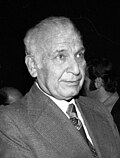| ||||||||||||||
| ||||||||||||||
| ||||||||||||||
An election for President of Israel was held in the Knesset on 10 April 1973. [1] Biophysicist and politician Ephraim Katzir was elected to the position in a secret ballot and took office the same day. He held this position until 1978, when Yitzhak Navon was elected as the new president.

